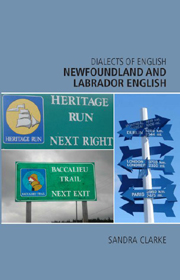4 - Vocabulary and discourse features
Published online by Cambridge University Press: 12 September 2012
Summary
The Newfoundland seal-hunters always speak of ‘seals’ as ‘swiles’, and for our word ‘carry’ they say ‘spell’. A school-master, who had been listening to a seal-hunter's story, said sneeringly: ‘Swiles! How do you spell swiles?’ ‘We don't spell ‘em’, replied the hunter; ‘we most generally hauls' em!’ (From the Dictionary of Newfoundland English, under the entry spell)
As the previous two chapters have shown, NLE constitutes a distinct North American variety with respect to both its pronunciation and its grammatical features. The same is true in the case of the regional lexicon of the province, as is well illustrated in the above citation, taken from an American children's magazine of 1895. In fact, the vocabulary of NLE is sufficiently distinct to have merited its own dictionary, the well-known Dictionary of Newfoundland English (DNE) (Story et al. 1990 [1982], available online at http://www.heritage.nf.ca/dictionary). As is the case for its phonological and grammatical systems, the lexicon of NLE exhibits a high degree of linguistic conservatism, as well as internal diversity.
NLE is characterised by the retention of many words and meanings that have either disappeared or are now archaic elsewhere, as well as by the preservation of a host of more localised regional items that were brought to the area from southwest England and southern Ireland. Most of the latter originate in Irish Gaelic. At the same time, a number of these words and phrases have undergone subsequent change, whether in meaning or in form.
- Type
- Chapter
- Information
- Newfoundland and Labrador English , pp. 102 - 131Publisher: Edinburgh University PressPrint publication year: 2010



